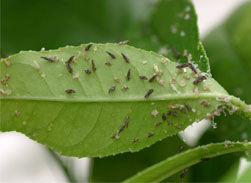The downtown Hollister discovery of a single female Asian citrus psyllid pest—which can carry a disease that devastates citrus trees—resulted in a quarantine within a five-mile radius of the original finding.
The insect can carry the disease huanglongbing, which causes a tree to decline in health and produce bitter, misshaped fruit until it dies. There is no cure, but fruit produced by an infected tree is still edible.
For those owning local lemon, orange and other citrus trees, the status means those transporting fruit out of the area should make sure it is free of leaves and stems. Commercial growers in the quarantine zone will also have to treat trees with a special spray before harvest and tarp trucks transporting fruit out of the area, said Karen Overstreet, the county agricultural commissioner.
“What we would like from residents is that if they’re going to move the fruit around that it’s clean and free of leaves and stems,” Overstreet said.
The quarantine zone includes the Hollister Municipal Airport, all of downtown and a significant part of the Hollister Hills State Vehicular Recreation Area.
Following the discovery of the pest in a lemon tree in a yard in downtown Hollister, the California Department of Food and Agriculture deployed 353 traps in the surrounding area, Overstreet said. For two weeks, workers checked the traps daily. Now, they will look at them weekly through the end of June and once a month after that for two years.
For more information on how to detect the insect, the boundaries of the quarantine zone and what the status means, go to the California Department of Food and Agriculture’s website: cdfa.ca.gov/plant/pe/interiorexclusion/acp_quarantine.html.










